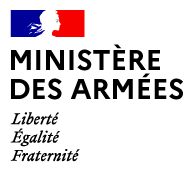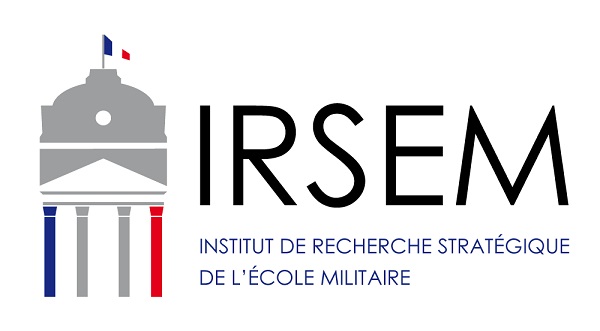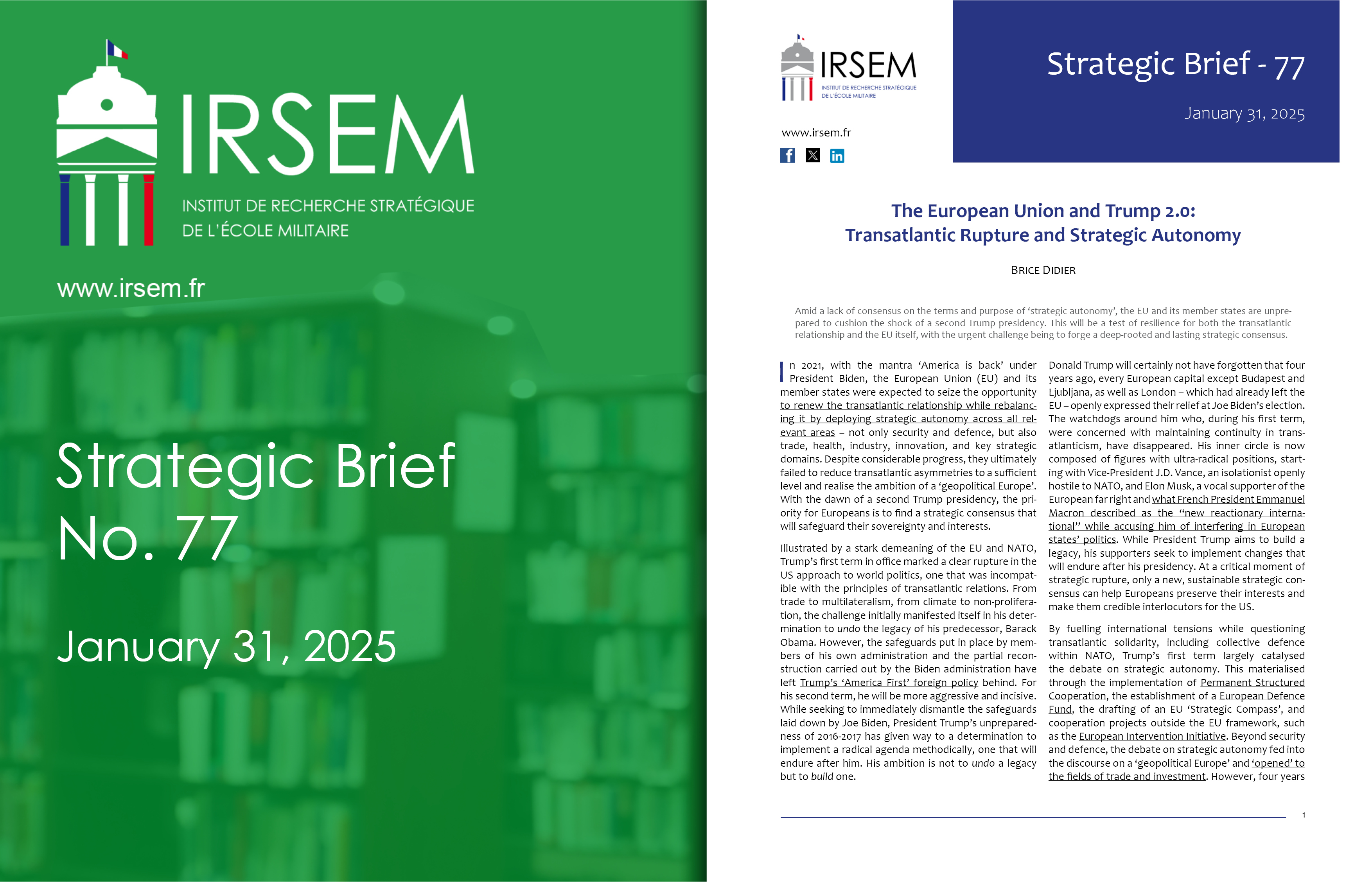Télécharger la brève stratégique n° 77 - 2025
The European Union and Trump 2.0: Transatlantic and Strategic Autonomy
Brice Didier
Amid a lack of consensus on the terms and purpose of ‘strategic autonomy’, the EU and its member states are unprepared to cushion the shock of a second Trump presidency. This will be a test of resilience for both the transatlantic relationship and the EU itself, with the urgent challenge being to forge a deep-rooted and lasting strategic consensus.
In 2021, with the mantra ‘America is back’ under President Biden, the European Union (EU) and its member states were expected to seize the opportunity to renew the transatlantic relationship while rebalancing it by deploying strategic autonomy across all relevant areas – not only security and defence, but also trade, health, industry, innovation, and key strategic domains. Despite considerable progress, they ultimately failed to reduce transatlantic asymmetries to a sufficient level and realise the ambition of a ‘geopolitical Europe’. With the dawn of a second Trump presidency, the priority for Europeans is to find a strategic consensus that will safeguard their sovereignty and interests.
Illustrated by a stark demeaning of the EU and NATO, Trump’s first term in office marked a clear rupture in the US approach to world politics, one that was incompatible with the principles of transatlantic relations. From trade to multilateralism, from climate to non-proliferation, the challenge initially manifested itself in his determination to undo the legacy of his predecessor, Barack Obama. However, the safeguards put in place by members of his own administration and the partial reconstruction carried out by the Biden administration have left Trump’s ‘America First’ foreign policy behind. For his second term, he will be more aggressive and incisive. While seeking to immediately dismantle the safeguards laid down by Joe Biden, President Trump’s unpreparedness of 2016-2017 has given way to a determination to implement a radical agenda methodically, one that will endure after him. His ambition is not to undo a legacy but to build one.
Donald Trump will certainly not have forgotten that four years ago, every European capital except Budapest and Ljubljana, as well as London – which had already left the EU – openly expressed their relief at Joe Biden’s election. The watchdogs around him who, during his first term, were concerned with maintaining continuity in transatlanticism, have disappeared. His inner circle is now composed of figures with ultra-radical positions, starting with Vice-President J.D. Vance, an isolationist openly hostile to NATO, and Elon Musk, a vocal supporter of the European far right and what French President Emmanuel Macron described as the “new reactionary international” while accusing him of interfering in European states’ politics. While President Trump aims to build a legacy, his supporters seek to implement changes that will endure after his presidency. At a critical moment of strategic rupture, only a new, sustainable strategic consensus can help Europeans preserve their interests and make them credible interlocutors for the US.
By fuelling international tensions while questioning transatlantic solidarity, including collective defence within NATO, Trump’s first term largely catalysed the debate on strategic autonomy. This materialised through the implementation of Permanent Structured Cooperation, the establishment of a European Defence Fund, the drafting of an EU ‘Strategic Compass’, and cooperation projects outside the EU framework, such as the European Intervention Initiative. Beyond security and defence, the debate on strategic autonomy fed into the discourse on a ‘geopolitical Europe’ and ‘opened’ to the fields of trade and investment. However, four years ago, the American shift, with Joe Biden signalling and confirming a renewed US commitment to the transatlantic partnership with the EU and NATO, prompted differing interpretations among EU members regarding the relevance of continuing progress on European defence. Joe Biden’s election polarised the debate on strategic autonomy, and his presidency has been a missed opportunity for the EU to rebalance the transatlantic relationship.
Trump is returning to power at a time when discussions on strategic autonomy in Europe have never been more lively. Ultimately, however, unprecedented developments have less to do with the US than with Russia and China. The Covid-19 crisis led to establishing strategic autonomy as an EU objective in a broader range of key sectors, such as industry and health, to reduce dependence on the US but also on China. In security and defence, Russia’s war of aggression against Ukraine triggered a European strategic awakening. While it revitalised NATO and reaffirmed its raison d’être, the EU emerged as a security and defence actor in its own right, for instance with the enhancement and publication of the Strategic Compass, the transformation of the European Peace Facility to provide lethal aid to Ukrainian forces, and the publication of a European Defence Industrial Strategy, alongside the appointment of an EU Defence Commissioner. These achievements should be built upon to further strategic autonomy.
EU strategic autonomy requires defining a common strategy based on European interests and autonomous, sovereign resources. While the conceptualisation of ‘strategic autonomy’ as strengthening NATO’s ‘European pillar’, as advocated by President Macron, has been a subject of debate among Europeans, strengthening European defence is, in practice, in line with what Trump has always called for: sharing the burden. Unprecedented increases in the defence budgets of European states, in response to Russia’s war of aggression against Ukraine, are effectively a response to President Trump’s previous demands for allies to invest more in their own defence. However, at NATO, where he had previously called for national defence budgets to reach 3 to 4 per cent of GDP before returning to the target of 2 per cent set before him, President Trump now seeks to impose a 5 per cent target. Careful to preserve US commitment to NATO, the Alliance’s new Secretary General Mark Rutte advocates substantial increases in European defence spending. However, it currently seems difficult for most European states to reach this target, with many still struggling to meet the 2 per cent target. The next NATO Summit in The Hague in June 2025 will be a critical test of solidarity and cohesion within the Alliance.
While the transatlantic and international context calls for further investment in defence by Europeans, the US administration seeks to maintain its defence industry’s momentum and flood the European market. However, it would be counterproductive for Europeans to invest heavily in US equipment, as this could provide the Trump administration with leverage over their dependence in the future. Amid the persistence of intra-European divisions and the lack of guarantees from the new US administration, the challenge for the EU and its member states is to formulate an approach that, while appeasing Trump through increased defence investment, simultaneously leads to further European autonomy. One of the challenges for Europeans is to navigate the various structures of the European security architecture more effectively. In the context of EU-NATO relations at its heart, this involves strengthening the interoperability of resources between the two organisations and asserting the role of the European defence industry at the transatlantic level.
This dilemma also extends to strategic issues beyond security and defence. Energy is a key example. The opportunity to purchase American energy, particularly LNG, would offer Europeans a way to reduce their dependence on Russia while satisfying US expectations. However, it would also reinforce their dependence on the US, providing Washington with the opportunity to weaponise this dependence in the future. Caught between a rock and a hard place, the EU must proceed strategically.
This period of challenges underscores the urgent need for a renewal of European unity, which is key to building a strategic consensus among Europeans. In addition to its members, the EU must rally those partners willing to preserve their relations with the US while avoiding strategic dependence, through pragmatic cooperation, such as with the UK. Such cooperation will be crucial if the EU is to take on a leadership role to counterbalance the threat posed by the second Trump administration, not only in terms of security and defence or trade but also in relation to global governance and its structures, especially if it resorts once again to institutional sabotage, withdrawal, budget cuts, or simply rhetorical demeaning.
Brice Didier, PhD, is postdoctoral researcher at SciencesPo’ Center for International Studies (CERI) and IRSEM-Europe. His research focuses on EU foreign and security policy, external relations, strategy, and transatlantic relations.



